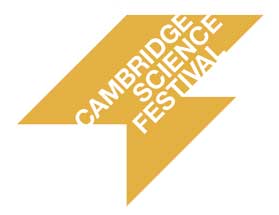
The Office of National Statistics released figures last week, showing that cancer is on the rise in England – 813 diagnoses per day. While, according to Macmillan Cancer Support, there are now an estimated 2.5 million people living with cancer in the UK, rising to 4 million by 2030.
This year, the Cambridge Science Festival hosts a series of events that present the latest in cancer research and treatments from a number of distinguished experts in their field.
One of the world’s leading childhood brain tumour experts, Professor Richard J Gilbertson, discusses the enormous challenges presented by the current statistics and how patients, healthcare professionals and the research community can work together every day to beat cancer during his talk Killing Cancer.
Commenting on the worldwide figures, Professor Gilbertson said: “Worldwide cancer diagnoses are expected to rise to 22 million by 2030. In addition to the human cost the financial burden in the UK alone amounts to more than £16 billion every year in healthcare.
“Cancer scientists and doctors within Cambridge are partnering with world leaders in physics, chemistry, engineering and even astronomy to devise new ways to diagnose and cure patients with cancer. In my own laboratory, we are studying the ‘language’ that cancer cells ‘speak’ in childhood brain tumours thereby detecting regional accents that tell us not only where these tumours are ‘born’, but also what is driving them and how to destroy them.”
One of the biggest problems faced by patients and practitioners is late diagnosis for many cancers such as cancer of the oesophagus. In her talk, Does a pill on a string hold the answer for earlier diagnosis of oesophageal cancer? Professor Rebecca Fitzgerald, from the MRC Cancer Unit, describes the 10-year journey to develop the Cytosponge test and what it takes to get such a simple idea into the clinic.
Speaking about the new test, Professor Fitzgerald said: “Our new Cytosponge test for cancer of the oesophagus has been a really exciting collaboration with lots of scientific disciplines. It has involved working with engineering and manufacturing for the device, developing new lab tests to see whether the cells are precancerous and working with primary care and public health to place the test into the clinic. It is a very simple idea but it seems to work!”
“We are now launching a new Cancer Research UK funded trial on 1st May. This will be a trial of over 80 surgeries spread throughout the UK (4,000 patients). The surgeries will be randomised into two groups. One group will treat their patients with heartburn in the same way that they would usually. The other group will offer all their patients a Cytosponge test to see whether they have Barrett's (a condition that can in some cases develop into cancer) as part of their clinical care. The trial will take three years to complete and should tell us whether this test is suitable for routine clinical use.”
Diseases like cancer remain largely incurable despite explosive growth in our knowledge of how they develop. In Making new medicines for old diseases, Professor Ashok Venkitaraman, also from the MRC Cancer Unit, discusses recent scientific advances that promise to transform our ability to translate biological knowledge into new medicines.
In his talk, Professor Venkitaraman discusses several topical and contentious issues. Firstly, he poses the provocative argument that current approaches for the development of new medicines fail to fully exploit new information on the genetics of disease, and covers recent research and new data that open alternative avenues to address this issue. In particular, for cancer therapy, Professor Venkitaraman argues that the time has come to move away from simply attempting to block the effect of faulty genes using new drugs, to tackling the changes that the faulty genes induce in the behaviour of diseased cells and organs. Secondly, he considers the impact of the burgeoning array of expensive new drugs on the costs of treating diseases like cancer. He asks, must we draw a line on cost versus efficacy, and if so, how?
An entirely new area of cancer therapy treatment that is proving very hopeful is immunotherapy, which harnesses and enhances the powers of the immune system to fight cancer. For instance, Cytotoxic T cells are white blood cells with remarkable properties. Upon recognition of cancer cells, these immune cells can develop into specialised serial killers. In Harnessing our immune system to combat cancer, Dr Maike de la Roche, from Cancer Research UK, explores how these cells destroy cancer tumours and how her newly appointed lab has started work to improve their killing capacity. Dr de la Roche also gives a comprehensive overview of current worldwide approaches to harness the immune system as an anti-cancer agent.
To understand different cancers and support the development of promising new treatments, the ability to collect and analyse large amounts of data is crucial. In Big data from small sources: computing demands in molecular and cell biology, Dr Peter Maccallum, from Cancer Research UK Cambridge Institute, discusses how revolutions in genomics, proteomics and imaging techniques mean biological data is being collected faster than ever, and the challenges of storing and processing these novel kinds of information. In a related event, Battling cancer with data science, Dr Shamith Samarajiwa, who leads the Integrative Systems Biomedicine Group at the MRC Cancer Unit, explores how 21st Century research uses data science and computational approaches to extract hidden biology from large datasets.















